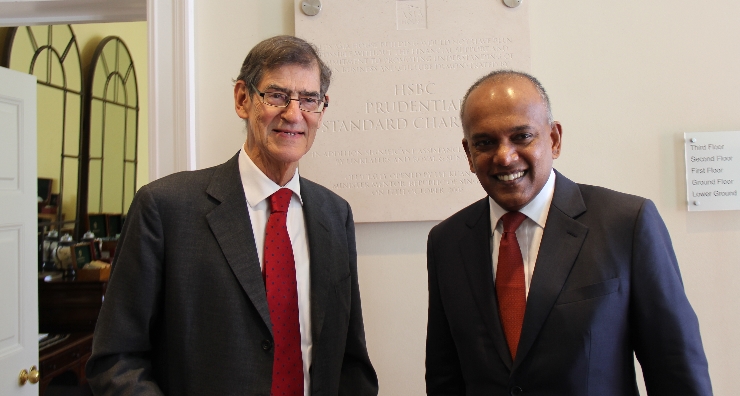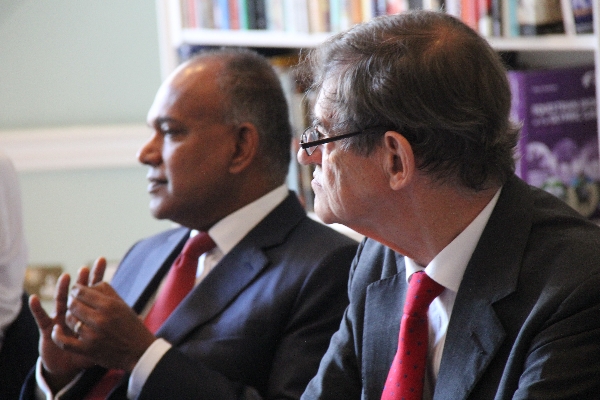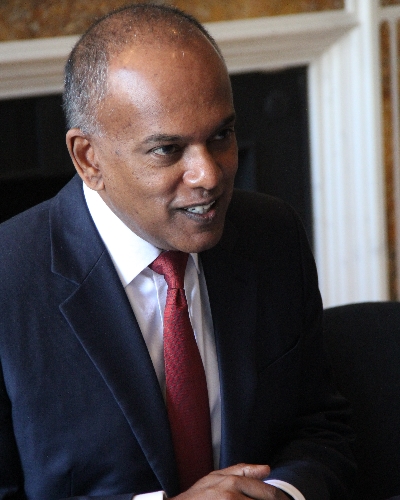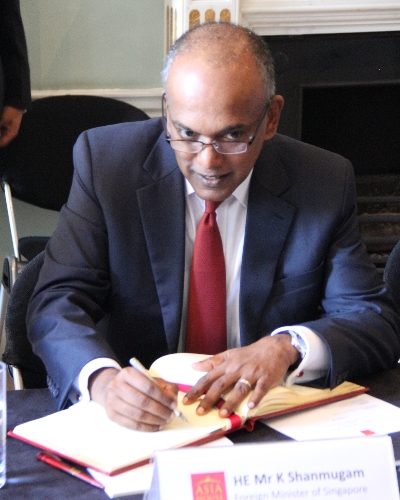Driving commercial and political engagement between Asia, the Middle East and Europe
Driving commercial and political engagement between Asia, the Middle East and Europe
Driving commercial and political engagement between Asia, the Middle East and Europe

Singapore is striving to become the New York of ASEAN and a regional hub for legal services which includes advising on Chinese law.
These were some of the comments made by the Minister for Foreign Affairs and for Law in Singapore, HE Mr K Shanmugam, in an interview with Asia House following a private briefing to Asia House corporate members on 16 July 2014.
He also said that, even though there has been a slight slowdown in the Chinese economy, which has been felt in Singapore, the economic relationship that most countries including Singapore have with China is positive.
He added the Chinese Government has appointed an RMB clearing bank in Singapore, which enables Singapore to play a role in RMB internationalisation.
The Minister for Foreign Affairs and for Law in Singapore, HE Mr K Shanmugam, visited Asia House on 16 July, 2014 for a private breakfast briefing exclusively for Asia House corporate members.
The breakfast briefing, which was held under Chatham House Rule, covered Singapore’s role in ASEAN, the future of ASEAN, recent developments in Southeast Asia, Singapore’s relationships with its neighbours in the region, and relations among the major powers, such as China, Japan and the United States.
Companies represented at the briefing included Shell, Rio Tinto, Standard Chartered, Lloyds Banking Group, Jardine Matheson, Prudential, KPMG and Greene Consultants.

HE Mr K Shanmugam and Asia House Chairman Sir John Boyd at the breakfast briefing for Corporate Members
In a separate one-to-one interview following the breakfast briefing, in response to a question about the impact of the slowdown of growth in China on Singapore, Mr Shanmugam said: “We can feel the impact, but China is such a large economy and still offers huge opportunities for everyone. Some sectors, for example financial services, are not rising or increasing as fast as they used to, but a lot of people still continue to benefit from the Chinese economy. In general, the economic relationship of most countries with China is still upward and positive.”
Mr Shanmugam, who was a Senior Partner with Allen & Gledhill LLP in Singapore before becoming an MP, then explained how Singapore was laying the groundwork to become a legal services hub in Asia. “Singapore aims to be the legal services centre for Asia,” he explained. “That means a lot of people from different nationalities and jurisdictions can come here and do their contracts and transactions in whatever law they choose. Chinese law firms have started opening up in Singapore. So have others, and British and American law firms have long been here, advising on their respective laws. We have specialist courses in our universities that teach the law of China as well as the law of a number of ASEAN countries so we will have a body of graduates who are specialised in these legal systems. The openness of Singapore for them to advise on their own laws and the ability of lawyers to do their work in Singapore are an attraction,” he said.
Singapore, which maintains strong ties with China, is also helping to internationalise the renminbi (or yuan) through cross-border renminbi flows between Singapore and Suzhou Industrial Park as well as Tianjin Eco-City, both of which are Government-to-Government projects between Singapore and China, he said. Apart from these two projects, there are also other bilateral projects such as the Guangzhou Knowledge City, the Singapore-Sichuan High-Tech Innovation Park, and Jilin Food Zone, which are private-sector led with support from the governments, he said.
“The Chinese are taking gradual steps to see how they can internationalise the renminbi. They have chosen Hong Kong and Singapore and they have recently done a deal in London and Frankfurt. This way you can now do renminbi transactions outside of China. It’s a careful and controlled experiment by China,” he added.
Earlier this month Mr Shanmugam, who was educated at Raffles Institution, one of the most prestigious schools in Singapore, called on the newly elected Indian Prime Minister Narendra Modi in New Delhi. “We are looking at a partnership with India and the prime minister mentioned a number of potential areas for cooperation, such as smart cities and urban rejuvenation. He wants to build 100 smart cities – the scale is large. Within our scope, Singapore can do some things and we suggested setting up a bilateral platform of ministers and officials who can look at these issues. We have good experience in areas such as building infrastructure, urban renewal and management, and the planning of smart cities. In all of those areas, we can share our experiences,” he said, adding the mood in India was very positive and upbeat. “There is a lot of hope and expectation being placed on the new Indian Government and the Government’s approach has been to emphasise the restructuring of the economy for the benefit of the Indian people.”

HE Mr K Shanmugam
But he noted that the power separation structure in India meant the central government needed to work hand-in-hand with the state governments. “One has got to understand that India is a large country with many different ethnic and linguistic groups; it is also a country divided into states that are ruled by different parties which may not always see eye-to-eye with the central government. Hence, when you have expectations of India, you must always factor these in,” he said. “There is a groundswell across India for good governance and the prime minister wants to push that through. But he needs cooperation from the states to do so,” he added.
Commenting on security in the Southeast Asia region, which has witnessed tensions connected to territorial disputes in the South China Sea, Mr Shanmugam said: “My main concern is that the disputes need to be managed in a way that does not lead to physical conflict.”
He pointed out that Singapore was a member of ASEAN and ASEAN had a role in trying to manage a peaceful resolution of some of the conflicts. He said that it was not just the ASEAN member states that “had a stake in having peace in the region.” Other major powers in the region also had a stake.
Speaking about his hopes for ASEAN, Mr Shanmugam said that he would like to see the goal of ASEAN 2015 fully realised and for ASEAN “to become one community economically, with freer movement of goods and services, and socially more integrated with greater people-to-people movement.”
He said Singapore did not view the emerging markets of Indonesia and the Philippines as competition for Singapore. Instead, he welcomed their growth. “They are very different from us. We are very service-focused and much smaller. The better these other economies perform, the better it serves everyone else. It is in our interest for everyone else to be prosperous, so that we too can be prosperous. Our vision is to be the New York of ASEAN, and you can’t be a successful New York if all the other countries around you are not doing well,” he said.
When asked about recent reports of tensions in Singapore over expats taking jobs from locals, Mr Shanmugam said: “There are genuine concerns. The underlying issues are the same around the world. The global economy is being restructured. Anything that can be done in Singapore can now be done overseas. Job security is no longer what it used to be.” He explained that Singapore had to bring in immigrants in order to keep the economy going. That said, “in Singapore, we are in a position where there are more jobs today than people,” he said. “Nevertheless, the fact that there are foreigners in Singapore creating competition for jobs has led to our people asking ‘How can the government do better to make sure my job is secure?’”
He said Singapore has set up a government watchdog to monitor the practices of companies and look out for discrimination, whether among Singaporeans or between Singaporeans and foreigners. A number of measures had also been introduced to reduce the total inflow of foreign labour.

HE Mr K Shanmugam signs the Asia House guest book
naomi.canton@asiahouse.co.uk
Asia House private briefings are open exclusively to Asia House corporate members. For more information on corporate membership please contact Vivi Qi, Asia House Corporate Membership Manager or click here.
Our next private briefing for corporate members will take place on Tuesday, 29 July 2014 when Richard Rekhy, CEO, KPMG India and Jaspal Bindra, CEO, Standard Chartered Bank Asia, will analyse India’s 2014 Budget and look at how it will affect UK companies.
For more details or to register contact our Business & Policy team.
Ho Ching, Executive Director and CEO of Temasek, an investment company based in Singapore, is to be awarded this year’s Asia House Asian Business Leaders Award. To book a table at the Gala Dinner and for more information on the event click here.
